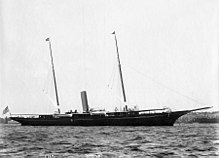USS Gloucester (1891)
 USS Gloucester 1898
| |
| History | |
|---|---|
| Name |
|
| Namesake | Gloucester, Massachusetts |
| Builder | Neafie & Levy |
| Launched | 1891 |
| Acquired | 23 April 1898 |
| Commissioned | 16 May 1898 |
| Stricken | 12 August 1919 |
| Fate | Sold 1919 |
| General characteristics | |
| Type | Gunboat |
| Displacement | 786 long tons (799 t) |
| Length | 240 ft 8 in (73.36 m) |
| Beam | 27 ft 2 in (8.28 m) |
| Draft | 12 ft (3.7 m) |
| Speed | 17 kn (20 mph; 31 km/h) |
| Armament | 4 × 6-pounder (32 mm (1.26 in)) guns |
USS Gloucester was a
Service history
Gloucester served in
On 25 July, she entered the harbor before the fleet at

Subsequently Gloucester cruised along the Eastern seaboard from
Decommissioned on 8 February 1905, at Pensacola, Florida, the ship was on duty with the Massachusetts and New York Naval Militias at New York City until recommissioned on 7 April 1917 at the Brooklyn Navy Yard. On 16 October 1909 she collided with tow steamer O'Brien Bros. in the East River off One Hundred and Thirty Fifth Street causing some damage to the tow steamer. Charles J. Johnson is listed as master at the time of the accident.[2]
Gloucester conducted harbor patrols at New York City until her name was struck from the Naval Vessel Register on 12 August 1919, and she was sold on 21 November.
Awards
References
- ^ a b Marine Engineering (1898). "Armed Yacht vs. Torpedo-Boat Destroyers". Marine Engineering. 2 (August 1898). Marine Publishing Company: 15. Retrieved 15 October 2014.
- ^ "Annual report of the Supervising Inspector-general Steamboat-inspection Service, Year ending June 30, 1910". Penn State University. Retrieved 14 January 2020.
Bibliography
- Eger, Christopher L. (March 2021). "Hudson Fulton Celebration, Part II". Warship International. LVIII (1): 58–81. ISSN 0043-0374.
- This article incorporates text from the public domain Dictionary of American Naval Fighting Ships. The entry can be found here.
